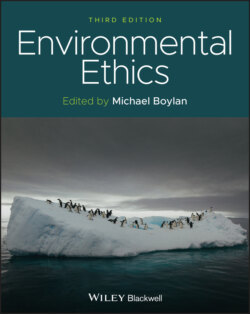Читать книгу Environmental Ethics - Группа авторов - Страница 45
Recognition of Necessity
ОглавлениеPerhaps the simplest summary of this analysis of man’s population problems is this: the commons, if justifiable at all, is justifiable only under conditions of low population density. As the human population has increased, the commons has had to be abandoned in one aspect after another.
First we abandoned the commons in food gathering, enclosing farm land and restricting pastures and hunting and fishing areas. These restrictions are still not complete throughout the world.
Somewhat later we saw that the commons as a place for waste disposal would also have to be abandoned. Restrictions on the disposal of domestic sewage are widely accepted in the Western world; we are still struggling to close the commons to pollution by automobiles, factories, insecticide sprayers, fertilizing operations, and atomic energy installations.
In a still more embryonic state is our recognition of the evils of the commons in matters of pleasure. There is almost no restriction on the propagation of sound waves in the public medium. The shopping public is assaulted with mindless music, without its consent. Our government is paying out billions of dollars to create supersonic transport which will disturb 50,000 people for every one person who is whisked from coast to coast 3 hours faster. Advertisers muddy the airwaves of radio and television and pollute the view of travelers. We are a long way from outlawing the commons in matters of pleasure. Is this because our Puritan inheritance makes us view pleasure as something of a sin, and pain (that is, the pollution of advertising) as the sign of virtue?
Every new enclosure of the commons involves the infringement of somebody’s personal liberty. Infringements made in the distant past are accepted because no contemporary complains of a loss. It is the newly proposed infringements that we vigorously oppose; cries of “rights” and “freedom” fill the air. But what does “freedom” mean? When men mutually agreed to pass laws against robbing, mankind became more free, not less so. Individuals locked into the logic of the commons are free only to bring on universal ruin; once they see the necessity of mutual coercion, they become free to pursue other goals. I believe it was Hegel who said, “Freedom is the recognition of necessity.”
The most important aspect of necessity that we must now recognize is the necessity of abandoning the commons in breeding. No technical solution can rescue us from the misery of overpopulation. Freedom to breed will bring ruin to all. At the moment, to avoid hard decisions many of us are tempted to propagandize for conscience and responsible parenthood. The temptation must be resisted, because an appeal to independently acting consciences selects for the disappearance of all conscience in the long run, and an increase in anxiety in the short.
The only way we can preserve and nurture other and more precious freedoms is by relinquishing the freedom to breed, and that very soon. “Freedom is the recognition of necessity,” and it is the role of education to reveal to all the necessity of abandoning the freedom to breed. Only so, can we put an end to this aspect of the tragedy of the commons.
